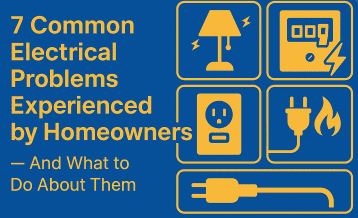7 Common Electrical Problems Experienced by Homeowners — And What to Do About Them
September 12, 2025
Common Electrical Problems
Electrical issues in the home can range from mildly annoying to seriously hazardous. Whether you’re dealing with flickering lights or a burning smell near an outlet, these problems often point to underlying issues that shouldn’t be ignored. Understanding the most common electrical problems—and knowing how to respond—can help homeowners stay safe, protect their property, and avoid costly repairs.
Here are seven electrical problems frequently experienced by homeowners, along with practical advice on how to handle each one.
1. Flickering Lights

Flickering lights are one of the most visible signs of electrical trouble. While they may seem harmless at first, they can indicate deeper issues that require attention.
What causes it:
A loose or improperly seated light bulb
Faulty wiring connections behind the fixture or switch
An overloaded circuit, especially when multiple appliances are running simultaneously
What to do: Start by tightening or replacing the bulb. If the flickering continues, unplug nearby devices to reduce the load on the circuit. Persistent flickering—especially across multiple rooms—may signal a wiring issue or an overloaded electrical panel. In that case, it’s best to contact a licensed electrician to inspect the system and ensure everything is safe and up to code.
2. Frequently Tripping Circuit Breakers
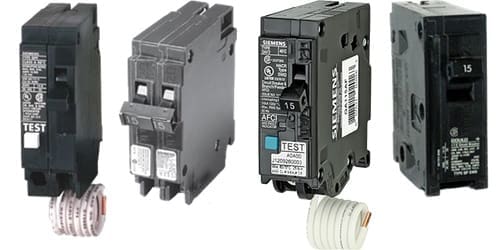
Circuit breakers are designed to protect your home by shutting off power when a circuit becomes overloaded. However, if breakers trip frequently, it’s can be a sign that your electrical system is under strain. Do no attempt to repair this without a certified electrician. Please feel free to check out we offer at All Circuits Electrical and book an appointment today.
What causes it:
Too many devices plugged into one circuit, each room is designated power by an individual circuit breaker. to many appliances plugged in, within the same room may cause an overload. sometimes
Faulty appliances drawing excessive current
Damaged or deteriorating wiring that can’t handle the load
What to do: Identify which devices are connected to the affected circuit and unplug some of them to reduce the load. Avoid running high-wattage appliances—like space heaters, microwaves, or hair dryers—on the same circuit. If the problem persists, have an electrician inspect the panel and wiring. You may need to upgrade the circuit or redistribute the load across multiple breakers.
3. Dead or Loose Outlets
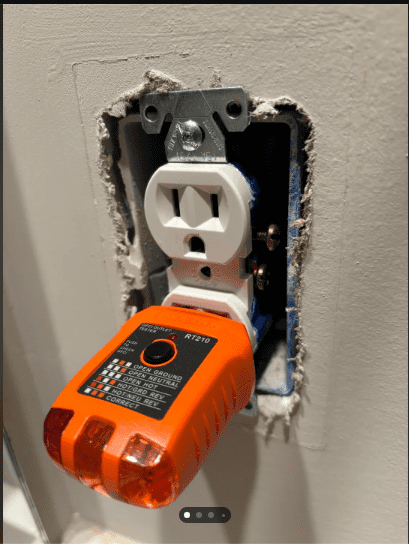
Dead outlets are a common frustration, especially in older homes. They can be caused by a variety of issues, some of which pose safety risks.
What causes it:
- A tripped Ground Fault Circuit Interrupter (GFCI) outlet
- Worn-out or damaged wiring behind the outlet
- Loose connections due to age or improper installation
What to do: Check nearby GFCI outlets—typically found in kitchens, bathrooms, garages, and outdoor areas—and press the reset button. If that doesn’t restore power, turn off the breaker and inspect the outlet for loose wires or signs of damage. Never attempt repairs unless you’re trained. A licensed electrician can safely diagnose and fix the issue, ensuring the outlet is properly grounded and secure.
4. Overloaded Circuits
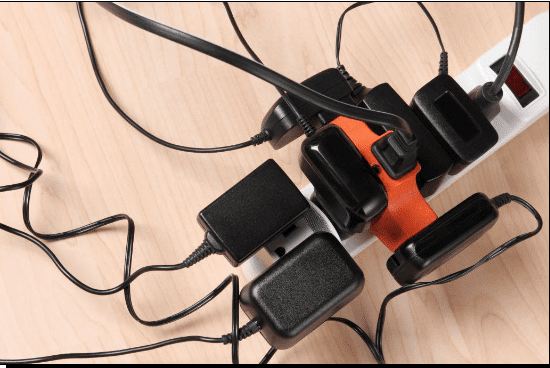
Overloaded circuits are a leading cause of electrical problems, especially in homes with outdated wiring or insufficient capacity for modern appliances.
What causes it:
- Plugging multiple high-power devices into one outlet or power strip
- Using extension cords to bypass limited outlet availability
- Running appliances that exceed the circuit’s rated capacity
What to do: Avoid plugging several high-wattage devices into the same outlet. Use dedicated circuits for major appliances like refrigerators, ovens, and air conditioners. If you notice dimming lights, warm outlets, or frequent breaker trips, it’s time to consider upgrading your electrical panel or adding new circuits to distribute the load more evenly. An electrician can assess your home’s power needs and recommend a safe, long-term solution.
5. Hot or Sparking Outlets and Switches
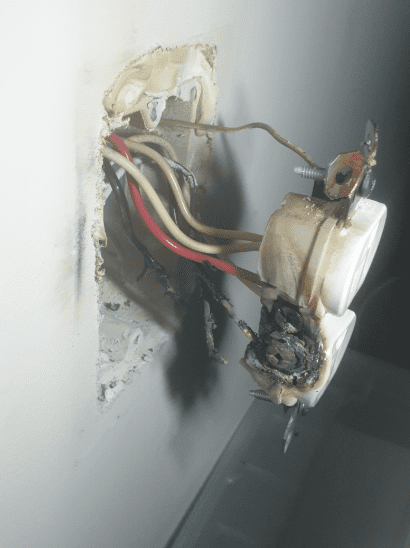
Heat, sparks, or discoloration around outlets and switches are serious warning signs. These symptoms often precede electrical fires and should be addressed immediately.
What causes it:
- Faulty or deteriorating wiring
- Loose connections behind the outlet or switch plate
- Overloaded circuits causing excessive heat buildup
What to do: Turn off power to the affected area at the breaker box. Do not use or touch the outlet or switch until it has been inspected. Contact a certified electrician right away. They’ll check for damaged wiring, secure any loose connections, and ensure the circuit is properly rated for the devices in use. Ignoring these signs can lead to fire hazards and costly damage.
6. Electrical Shocks

Experiencing a shock when plugging in a device or touching a switch is not only alarming—it’s dangerous. Even mild shocks can indicate serious electrical faults.
What causes it:
- Improper grounding of outlets or devices
- Damaged or exposed wiring
- Faulty appliances leaking current
What to do: Stop using the outlet or device immediately. Shut off power to the area and avoid contact until a professional can inspect the system. Electrical shocks are often a sign of grounding issues, which can lead to injury or fire. A licensed electrician will test the outlet, check for exposed wires, and ensure your home’s grounding system is intact.
7. Burning Smells
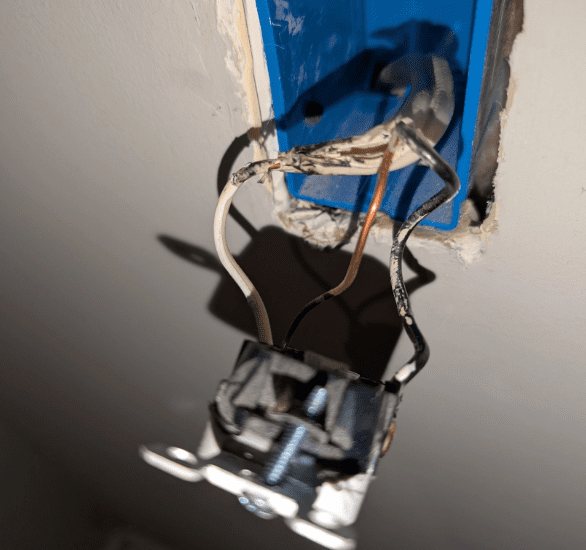
A burning smell near outlets, switches, or your electrical panel is a red-alert situation. It often means wires or components are overheating and could ignite.
What causes it:
- Overloaded circuits pushing wires beyond their capacity
- Melting insulation due to excessive heat
- Faulty wiring or malfunctioning devices
What to do: Immediately shut off power to the affected area. Do not plug anything into the outlet or use nearby switches. Call an electrician without delay. Electrical fires can start silently and spread quickly, so it’s critical to act fast. A professional will inspect the wiring, identify the source of the heat, and make necessary repairs to prevent future hazards.
Final Tips for Homeowners
Electrical problems aren’t always dramatic, but they’re never something to ignore. Here’s a quick reference guide to help you respond appropriately:
| Problem | Quick Fix | When to Call a Pro |
| Flickering Lights | Tighten bulbs, replace bulbs unplug devices that may use high wattage | If issue persists across multiple rooms |
| Dead Outlets | Reset GFCI outlet, check the circuit breaker panel. (you may have more than one panel) | If reset doesn’t work or outlet is damaged |
| Tripping Breakers | Unplug devices, redistribute load. | If tripping continues frequently |
| Overloaded Circuits | Use fewer devices per outlet | If lights dim or outlets feel warm |
| Hot/Sparking Outlets/Switches | Shut off power immediately | Always call a professional |
| Electrical Shocks | Stop use, shut off power | Always call a professional |
| Burning Smells | Shut off power immediately | Always call a professional |
Why Professional Help Matters
While some electrical issues have simple fixes, many are symptoms of deeper problems that require expert attention. Certified electricians have the tools and training to diagnose issues safely, ensure compliance with local codes, and protect your home from fire hazards and electrical failures.
If you’re in Northern Colorado and experiencing any of these problems, All Circuits Electrical is here to help. We specialize in residential diagnostics, repairs, and system upgrades—keeping your home safe, efficient, and reliable.
Ready to Fix Electrical Problems?
Don’t wait for a small issue to become a major one. Whether it’s flickering lights or a burning smell, trust your instincts and take action. Contact All Circuits Electrical today for a fast, professional assessment and peace of mind.
